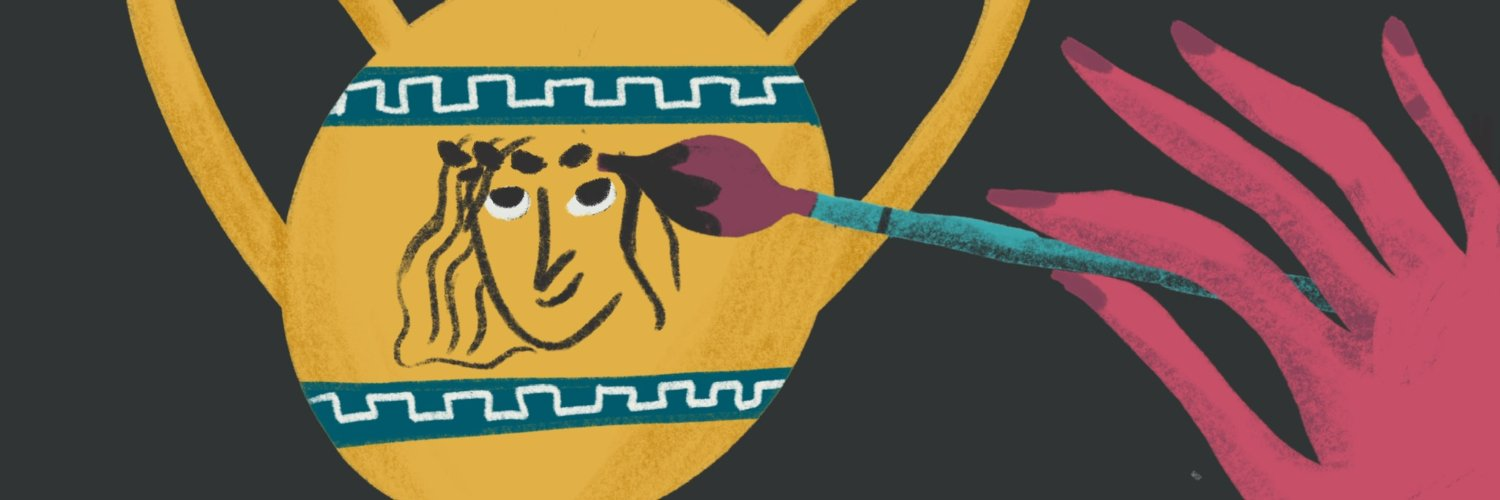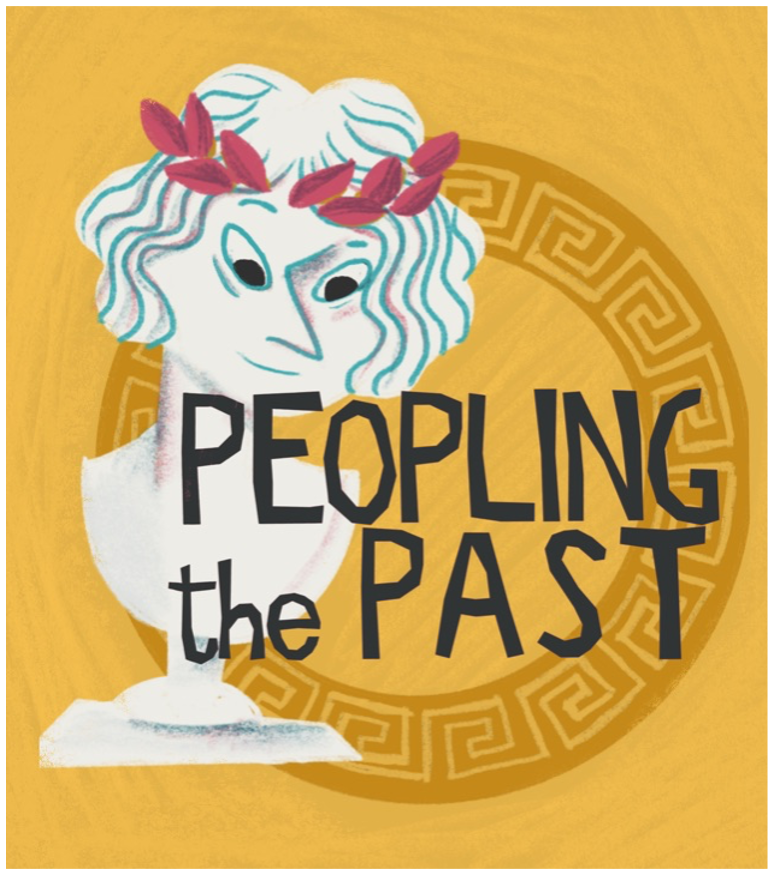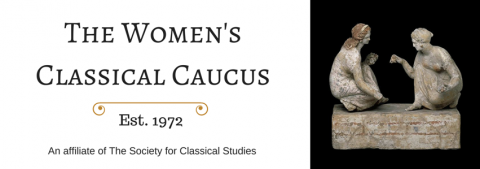In Part 3 of our guest series for the SCS Blog, the Women’s Classical Caucus (WCC) invites you to celebrate the winner of its 2020-21 Public Scholarship Award: Peopling the Past, a grassroots group of Canadian archaeologists and art historians of the ancient Mediterranean who have created resources accessible to audiences of all ages.
Since launching in September 2020, Peopling the Past has released 13 podcast episodes, 10 videos, and 15 blog posts. Their website (http://peoplingthepast.com) has been viewed 19,561 times by 7,735 unique visitors from 72 countries. Their audience has grown on all their social media platforms (@peoplingthepast): on Facebook they have 436 Likes and 496 followers, on Instagram they have 408 followers; and on Twitter they have 837 followers and a total of 307,500 impressions.
In the following interview, learn more about the development, success, and possible futures of the Peopling the Past initiative. We also invite you to read Part 1 and Part 2 of this three-part series of profiles. (N.B.: the answers below have been lightly edited for length and clarity).

Drawing by Nadia Alam.
Who is the team behind Peopling the Past?
We are a group of friends, colleagues, and former classmates from the University of British Columbia in Canada who have stayed in touch over social media.
Carolyn Laferrière, Postdoctoral Scholar with the Center for the Premodern World at the University of Southern California, Twitter: @cm_laferriere
Chelsea Gardner, Assistant Professor of Ancient History at Acadia University, Twitter: @archaeoctopus
Christie Johnston, Assistant Professor of Ancient Mediterranean History at Western Washington University, Twitter: @archaeologuest
Megan Daniels, Assistant Professor of Ancient Greek Material Culture at the University of British Columbia, Twitter: @meganjdaniels
Melissa Funke, Assistant Professor of Classics at the University of Winnipeg, Twitter: @MelissaKAFunke
Sabrina Higgins, Assistant Professor cross-appointed between the Departments of Humanities and Archaeology at Simon Fraser University, Twitter: @sabrinacaitlin
What is the Peopling the Past origin story?
CHELSEA: Peopling the Past was born out of the COVID-19 pandemic and probably wouldn’t exist if the world hadn’t come to a halt in March 2020. By April, archaeologists saw their plans for overseas summer field research dissolve, and, at the same time, many universities pivoted towards virtual and/or hybrid teaching programs for the summer and extending into the fall. I turned my unspent field energy toward brainstorming the creation of innovative, accessible pedagogical materials for my upcoming fall courses. On April 28th, I tweeted: “What if I create short podcasts for Greek Art/Archaeology classes? Would anyone out there use these for teaching if they go online in the fall?” Immediately, I received enthusiastic responses from my former University of British Columbia graduate school classmates: Carolyn Laferrière, Christine Johnston, and Megan Daniels. We brought Sabrina Higgins and Melissa Funke (also UBC alumnae) on board to complete our team of all Canadian women. Together, we decided that this initiative could — and should — be a larger, web-based digital humanities project that provided open-access educational resources for the study of the ancient Mediterranean world. Our project title, “Peopling the Past,” reflects our main goal: to create and host free, open-access resources for teaching and learning about real people in the ancient world and showcase cutting-edge research by the real people who study them today. We wouldn’t exist without the support of the Classics community and all our listeners, viewers, visitors, and followers. In particular, we owe an enormous debt of gratitude to our early podcast and video guests, who took the leap with us before the project had officially launched and graciously shared their time with us.
Who is your target audience? What have you learned about your audience and the field from the different conversations, content, and resources you have been offering
MELISSA: Our target audience is undergraduates, high school students, and the general public; however, many of our features, especially the blog posts, will be of interest to colleagues who are keen on staying up to date with new research emerging in our field. Our grad-student feature, in particular, calls attention to brand-new, cutting-edge research that challenges methodological and disciplinary boundaries.
Because we share each new blog post, video, and podcast on social media, we’re able to see who is accessing and sharing them and follow online conversations about the work. We’ve had grade school teachers reach out to tell us how they’ve used our materials in their classrooms, and we know that many of our colleagues in ancient studies have assigned our videos and podcasts to their undergraduate students. Members of the general public have also contacted us to tell us how much they’ve enjoyed our materials. What we can see from these responses is that people have really connected to our focus on the daily lives of real people. This is often the kind of information about the ancient world that doesn’t make it into popular culture or, when it does, it has been terribly distorted. Having access to good-quality, but accessible, scholarship seems to have really resonated with our audience.
And from our own perspective, we’re all very excited each time we put together a new post or video or podcast, because we get to learn about what our colleagues are working on. There is nothing more engaging than talking to people about what excites them about their research and hearing about new perspectives on antiquity.
How do you gather and source your content? How do you want your users to engage with your content?
CHRISTIE: In gathering and sourcing our content, we focus on telling the stories often left out of traditional histories from perspectives underrepresented in archaeology and classics. We are incredibly fortunate that so many scholars have been willing to share their time and their expertise with us. All of the media we produce is open-access and circulated through a variety of free platforms (e.g., Spotify and YouTube) so that they can be used by anyone with internet access. We also include captions and transcripts for all of our videos and podcasts.
Each post on the Peopling the Past (PtP) website includes accompanying resources (links to readings, media, webpages), drawn predominantly from open-access material. We want to make it easy for educators to incorporate this material in their classroom — especially if the topic is outside of their area of expertise. We try to produce content that is accessible for general audiences while being of interest to specialists and students in our disciplines. We want all ancient history enthusiasts, from inside and outside of the field, to be able to enjoy and share Peopling the Past material.

Image from the Peopling the Past website.
What are your hopes for the future of your organization? What challenges and opportunities has the pandemic presented to your project?
MEGAN: We want to continue producing open-access educational content in the form of short videos, podcasts, and blogs. All of these features continue to evolve: season two of the podcast, focusing on Roman archaeology, is underway, and a new slew of videos on a wide range of topics will be taped through the spring. The blog has evolved some new themes, including a series on “Unknown Peoples” (our first two posts are here and here), focusing on understudied and/or marginalized peoples in the past and the researchers who study them, as well as a number of graduate student features, aimed at amplifying the voices and work of emerging scholars studying the ancient world.
Some new steps we’ll be taking in the coming months involve creating open-source teaching packages that combine Peopling the Past content into learning modules with activities, quizzes, and discussion prompts. These packages will be freely available and can be flexibly incorporated into undergraduate and even high-school courses on a wide range of topics. Our overall aim is to keep Peopling the Past as a free and valuable resource for use within a wide range of curricula on the ancient world, helping educators bring the voices and experiences of real people, both past and present, into the classroom.
In all honesty, the pandemic is what spurred this project, as discussed above — we all came together in the limbo that followed the drying-up of fieldwork projects and overseas travel in the summer of 2020. The opportunities afforded by the increased digital infrastructure of the 2020 classroom certainly helped, alongside the support from our respective universities and external organizations (including the WCC!) that quickly came together to support digital and public scholarship. Much of the content we produce is very well-suited for the digital and asynchronous learning environment, and it has found support and recognition from funding bodies that emphasize open-access research. The challenges brought about by the pandemic will be familiar to most — the blurred lines between home and work took tolls on people’s time in many respects, and the technical demands of video and podcast production have been humbling to say the least!
What challenges do you foresee the pandemic bringing for the field in general?
MEGAN: The fields of archaeology, classics, and history obviously thrive through research and fieldwork practices that are worldwide in scope, so the restriction in movement and interaction has certainly challenged many research agendas. But closer to home are the financial challenges on institutions of learning that have made it even harder for younger scholars to move forward in their careers. If there’s one thing Peopling the Past has taught us, it’s how many vibrant, young scholars are out there doing the work to move these fields in new directions, both through their academic research and also their own voices and experiences, and they need support and amplification. We hope that educational institutions and governments will commit to building back in ways that allow emerging scholars to continue their work and move ahead in their careers.
What do you want people to know about Peopling the Past?
MELISSA: Just as our content focuses on individuals and stories that are often lost or overshadowed by traditional historical narratives, we also want to challenge the narrow stereotypes of who gets to tell history by providing a platform for scholars from underrepresented groups and those in the early stages of their careers. We are committed to providing quality content that is as accessible as possible, to as wide an audience as possible. We are also currently working to secure funding that will allow us to compensate the contingent academics that contribute to our videos, podcasts, and blog posts and to pay students to do work including video and podcast editing.
This project came about by asking “What if?” during a challenging time, but because the six of us came together with our various approaches to antiquity and different skill sets, we were able to create a resource that responds to this new reality and has connected a wide variety of scholars to new audiences.
What message would you give to people interested in public scholarship? Or to archaeologists who can’t go into the field?
CHELSEA: Our public-facing initiatives have provided, in my experience, a wonderfully engaging and accessible way to stay up to date on recent research in the field. With this project, we’ve been able to feature exciting content and expand our own horizons beyond the type of work we encounter on a regular basis. If you’re interested in existing public scholarship, some of our favorite projects include: Everyday Orientalism, Digital Hammurabi, Notes from the Apotheke, Partial Historians. If you’re interested in creating or contributing to public-facing scholarship, make sure to consider audience, time, hosting platforms, funding, and longevity. We’re happy to chat more about these factors, but it’s important to keep in mind that producing digital tools and public-facing resources are just as much work as publishing in traditional academic venues! Finally, for archaeologists who can’t go into the field: we acknowledge that this is an incredibly difficult time to be an archaeologist, particularly for early-career researchers, graduate students, and individuals from equity-seeking groups. Data collection and field experience are integral to our research trajectories, and any advice that suggests otherwise (“turn your attention to something else for a while”; “publish some of your early work”) frankly misses the mark and assumes a level of security and privilege. Peopling the Past comprises a group of scholars who are primarily in permanent academic positions, and it was precisely this security that allowed us the freedom to embark upon this project when our field plans fell through. So, we fully acknowledge our collective privilege, and we seek to lift up the voices of those who don’t have similar platforms, funding, time, or job security. If there’s a person, project, or research you think we should highlight, please email us.
How does winning the WCC Public Scholarship Award affect your work?
CHRISTIE: We are thrilled to receive this award. All of the funds have been put towards honoraria for the graduate students profiled on our blog. One of our primary goals with the project is to amplify the work of young and under-represented scholars and the amazing research that they are doing, which we do through such things as a blog series highlighting the work of graduate students. We are also very conscious of the fact that junior, contingent, and marginalized scholars are often both inundated with requests for service work and undercompensated for this labor. We are very thankful to the WCC for its support and for giving us the ability through this award to compensate these scholars for their contributions to the Peopling the Past project.
This blog post was produced by the Women’s Classical Caucus (WCC). The coordinators of this three-part series featuring WCC Award winners are Caroline Cheung and Suzanne Lye, co-chairs since January 2021 of the WCC. The WCC was founded in 1972 and is one of the oldest SCS-affiliated groups. The WCC seeks to incorporate feminist perspectives in the study and teaching of ancient Mediterranean cultures and strives to advance equity and diversity within the profession of Classics. The WCC is open to all. We welcome anyone who believes in our mission to become a member and participate in our exciting new initiatives as we head into our 50-year anniversary. (Click here if you would like to volunteer!)
Header image: logo of the Women's Classical Caucus



